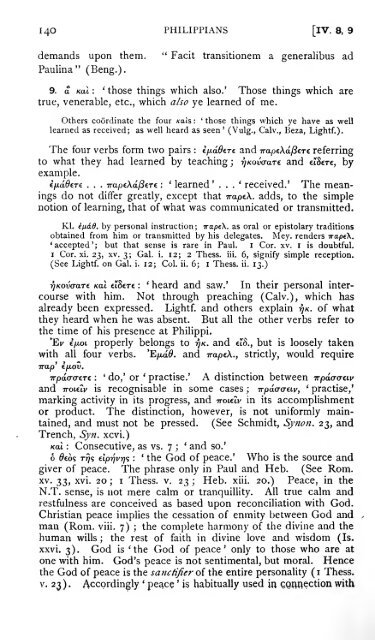Philippians and Philemon - MR Vincent - 1906.pdf
Philippians and Philemon - MR Vincent - 1906.pdf
Philippians and Philemon - MR Vincent - 1906.pdf
Create successful ePaper yourself
Turn your PDF publications into a flip-book with our unique Google optimized e-Paper software.
I40 PHILIPPIANS [IV. 8, 9<br />
dem<strong>and</strong>s upon them. " Facit transitionem a generalibus ad<br />
Paulina" (Beng.).<br />
9. :<br />
' those things which also.' Those things which are<br />
true, venerable, etc., which also ye learned of me.<br />
Others coordinate the four /cais :<br />
' those things which ye have as well<br />
learned as received; as well heard as seen ' (Vulg., Calv., Beza, Lightf.).<br />
The four verbs form two pairs : iixaOere <strong>and</strong>€€€ referring<br />
to what they had learned by teaching; ^' <strong>and</strong> ciSere, by<br />
example.<br />
(... :<br />
' learned "... * received.' The mean-<br />
ings do not differ greatly, except that.adds, to the simple<br />
notion of learning, that of what was communicated or transmitted.<br />
Kl. 4. by personal instruction .as ; oral or epistolary traditions<br />
obtained from him or transmitted by his delegates. Mey. renders.<br />
•accepted'; but that sense is rare in Paul. i Cor. xv. i is doubtful.<br />
I Cor. xi. 23, XV. ; 3 Gal. i. 12; 2 Thess. iii. 6, signify simple<br />
(See Lightf. on Gal. i. 12; Col. ii. 6; i Thess. ii. 13.)<br />
reception.<br />
7€ etSere<br />
:<br />
' heard <strong>and</strong> saw.' In their personal intercourse<br />
with him. Not<br />
already been expressed.<br />
through preaching<br />
Lightf. <strong>and</strong> others<br />
(Calv.), which has<br />
explain . of what<br />
they heard when he was absent. But all the other verbs refer to<br />
the time of his presence at Philippi.<br />
c/Aoi properly belongs to tjk. <strong>and</strong> eiS., but is loosely taken<br />
' €,<br />
with all four verbs. .<br />
<strong>and</strong><br />
., strictly,<br />
would require<br />
' ' do,' or practise.' A distinction between €:<br />
<strong>and</strong> TTotetv is recognisable in some cases ; practise,' ,'<br />
marking activity in its progress, <strong>and</strong> iroidv in its accomplishment<br />
or product. The distinction, however, is not uniformly maintained,<br />
<strong>and</strong> must not<br />
Trench, Syn. xcvi.)<br />
be pressed. (See Schmidt, Synon. 23, <strong>and</strong><br />
'<br />
: Consecutive, as vs. 7 ; <strong>and</strong> so.'<br />
' ^£05 T^s : the Crod of peace.' Who is the source <strong>and</strong><br />
giver of peace. The phrase only in Paul <strong>and</strong> Heb. (See Rom.<br />
XV. 33, xvi. 20 ; I Thess. v. 23 ; Heb. xiii. 20.) Peace, in the<br />
N.T. sense, is not mere calm or tranquillity. All true calm <strong>and</strong><br />
restfulness are conceived as based upon reconciliation with God.<br />
Christian peace implies the cessation of enmity between God <strong>and</strong><br />
man (Rom. viii. 7) ; the complete harmony of the divine <strong>and</strong> the<br />
human wills ; the rest of faith in divine love <strong>and</strong> wisdom (Is.<br />
xxvi. 3). God is 'the God of peace' only to those who are at<br />
one with him. God's peace is not sentimental, but moral. Hence<br />
the God of peace is the sanctifier oi the entire personaUty (i Thess.<br />
v. 23). Accordingly * peace ' is habitually used in ggnnection with





